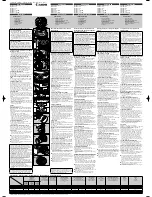
SEED Co., Ltd.
3. Personal qualities
Anyone who cannot follow the recommendations of their eye care practitioner, anyone who cannot use
contact lenses properly, anyone who fails to attend regular check-ups, anyone who cannot follow the hygiene
routine required to wear contact lenses, anyone who has an extremely nervous disposition.
WARNINGS
・
Even when used properly, wearing contact lenses may cause eye disorders such as the following, and if left
untreated, these eye disorders may become serious or may result in loss of sight. To wear your contact lenses
safely, be sure to read this Instructions for Use carefully and to follow the instructions of your eye care
practitioner and the proper methods for handling contact lenses.
Example for eye disorders
・
Corneal edema
・
Corneal ulcer
・
Corneal infiltration
・
Corneal epithelial erosion
・
Keratitis (including infectious keratitis)
・
Conjunctivitis (including giant papillary conjunctivitis)
・
Possibility of speeding up reduction in corneal endothelial cells
・
Possibility of changing the shape of the cornea
・
Lenses may be damaged or become damaged. If you have inadvertently worn a lens which is damaged or
otherwise faulty, or if a lens becomes damaged while you are wearing it, remove the lens immediately and
consult your eye care practitioner immediately, regardless of whether you have any subjective symptoms.
PRECAUTIONS
・
Be sure to read this Instructions for Use carefully before using your contact lenses, and if you are in any doubt
about the terms or information contained herein, please consult your eye care practitioner for clarification
before using the lenses.
・
Retain this Instructions for Use for future reference.
1. Avoid direct sunlight and avoid freezing, store at room temperature.
2. Do not wear contact lenses that are damaged.
3. Do not use contact lenses past their expiration date.
4. Do not wear contact lenses for longer than the recommended wearing period.
5. Use contact lenses properly in accordance with recommended methods for handling contact lenses.
6. Always attend regular contact lens check-ups.
7. If you experience any problem at all, consult your eye care practitioner immediately.
8. Always insert lenses promptly after opening, as lenses may become contaminated. If you do not use the lenses
straight away, store them according to the instructions of the lens care products.
9. Avoid rubbing your eyes while wearing lenses, as this may result in scratches to your eyes or displacement of
the lenses.
10. Do not mix up right and left lenses, as doing so may result in impairment of vision and discomfort.
11. Make sure you have appropriate glasses to use in case you are unable to wear your contact lenses due to the
condition of your eyes or for other reasons, or after you have worn your lenses for the wearing period
recommended by your eye care practitioner. Continuing to wear your contact lenses regardless may cause eye
disorders or other problems.
12. Do not wear contact lenses for driving or operating machinery until you are used to them.
13. If a lens becomes decentered or falls out while you are driving or operating machinery, stop driving or operating
the machinery promptly after making sure that it is safe to do so.
14. Follow the instructions of your eye care practitioner if using eye drops while wearing contact lenses.
15. Do not allow cosmetics, pharmaceuticals or other substances to come into contact with your lenses. If cosmetics
(eyeliner, cleansing products, etc.) become attached to your lenses through your tears, this may result in
discolouration or deterioration in the quality or the lenses, making them unusable.
16. When your eyes are exposed to strong wind (when riding a motorbike or bicycle, skiing, in strong wind, etc.),
always use some kind of protection against the wind such as sunglasses or goggles. Failure to do so may result
in uncomfortably dry lenses or the loss of a lens.
17. Consult the eye care professional about wearing lenses during sporting and water related activities. Exposure
to water while wearing contact lenses in activities such as swimming, water skiing, and hot tubs may increase
the risk of ocular infection, including but not limited to Acanthamoeba keratitis.
18. Never allow contact lenses to come into contact with non-sterile liquids (including tap water and saliva) as











